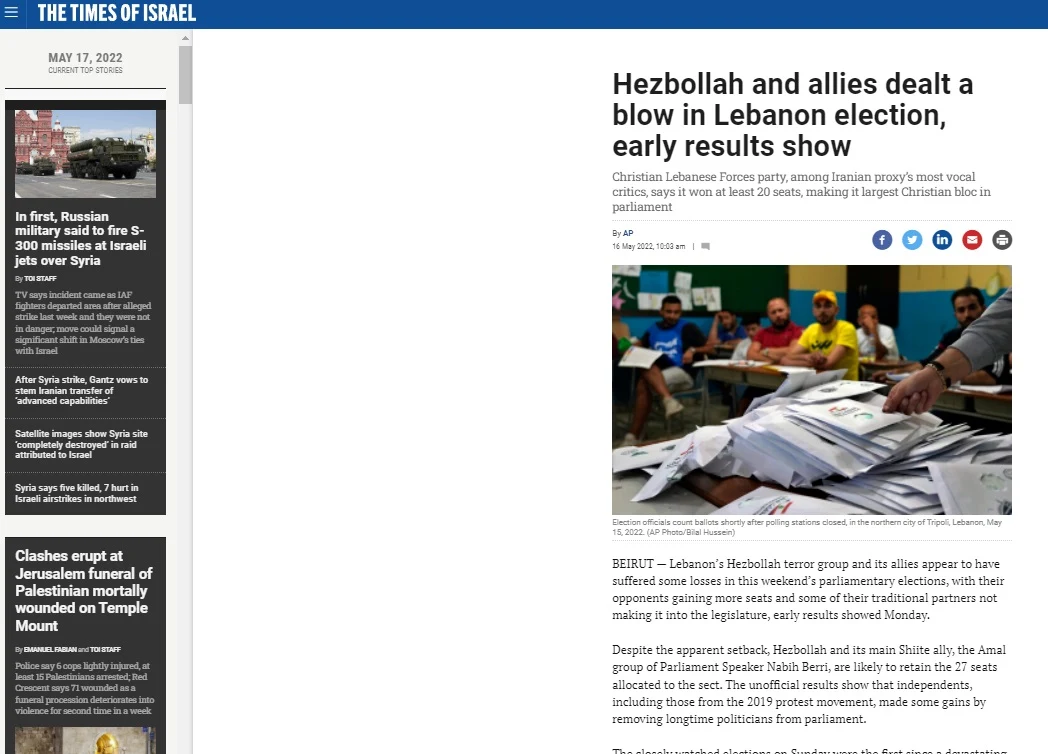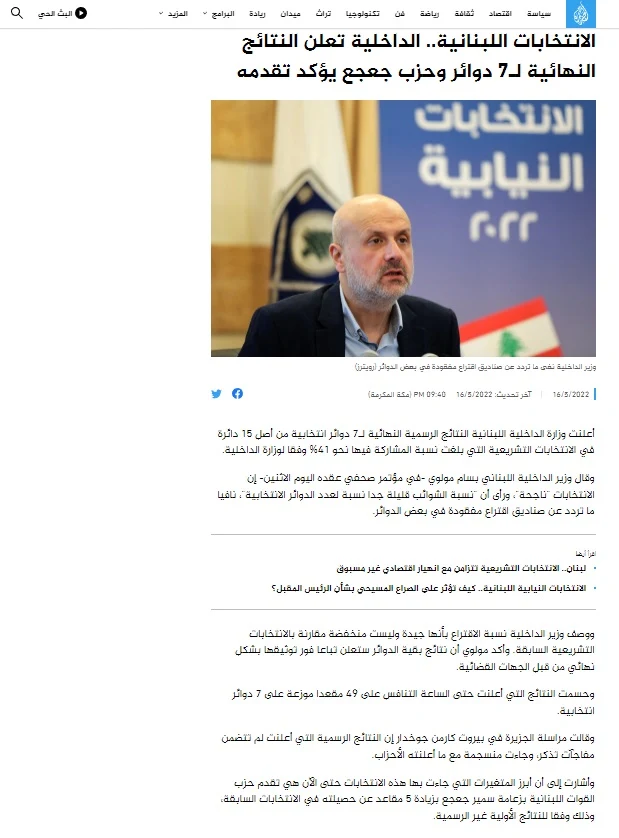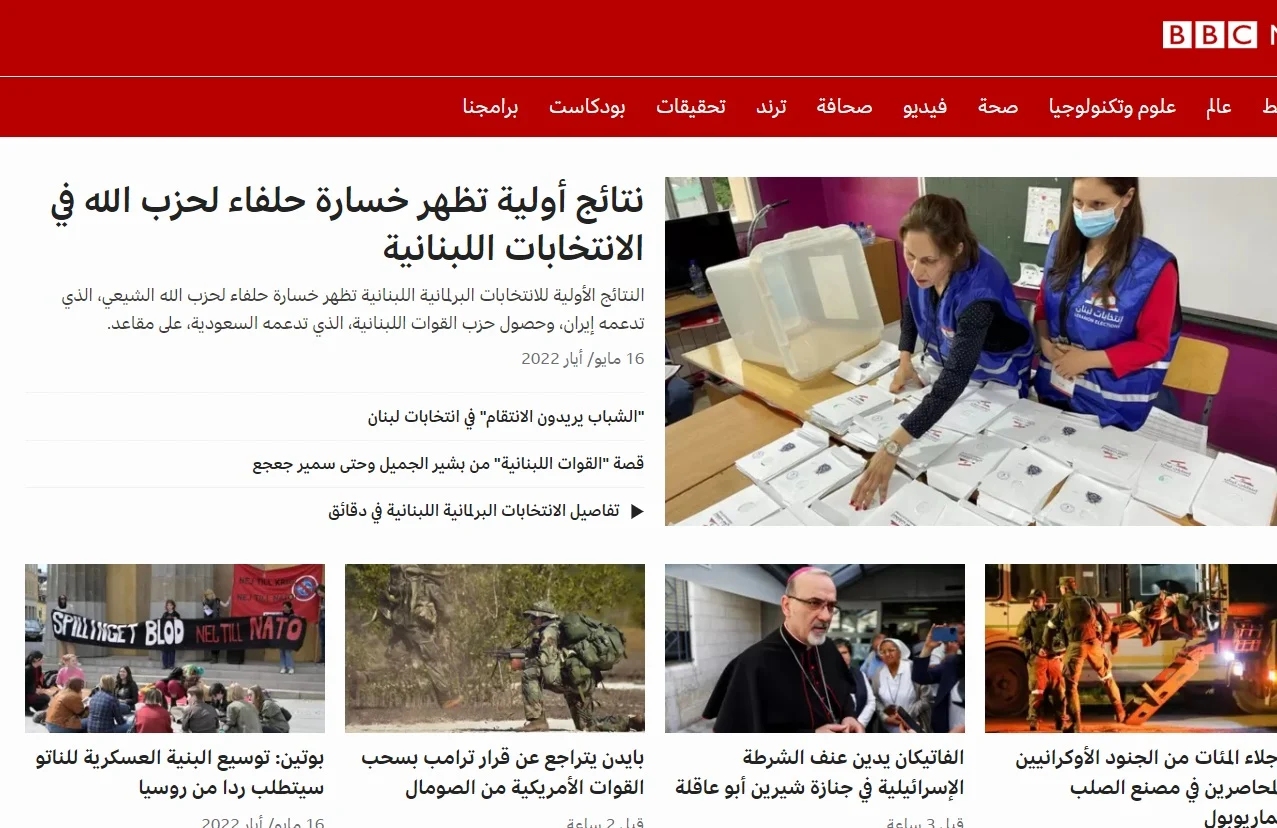24 hours was enough to turn the picture of the results that the opponents of Hezbollah and the Free Patriotic Movement wanted to circulate on Sunday evening. If Hezbollah (along with its ally, President Nabih Berri) has firmly seized the entire Shiite parliamentary bloc over the whole of Lebanon, what emergped from the developments in the Christian community ended in the absence of the image of victory that the Lebanese forces spread on Sunday evening, and official and unofficial results showed that the current The Free Patriotic Movement won a parliamentary bloc that outperforms the forces bloc. And if the loss of the current in the Jezzine district represented a major blow, the forces’ loss of one of the two seats of Bcharre was a major and unprecedented blow, bearing in mind that scrutiny of vote percentages remains linked to reviewing the full results. A quick reading of the names of the winners from the members of the two teams or those allied with them shows the movement's progress over the forces by at least a seat.
What was remarkable on the day following the count was not only the loss of some Hezbollah allies, including all the Syrian Social Nationalist Party candidates and candidates Talal Arslan, Wiam Wahhab and Marwan Khair al-Din, but rather the ability of youth groups that emerged from the October 17 uprising to achieve serious violations in several circles. It can be said that these groups succeeded in challenging the traditional forces in the south, the Bekaa, the mountains and the north, in addition to Beirut.
Detailed political readings will occupy the scene over the next few days. But what must be confirmed until now is not promising, especially since the voting in most constituencies was based on a sharp sectarian and sectarian background, and even the boycott in many constituencies reflected the frustration of a large part of the Sunnis who represent the base of the Future Movement.
In practice, the official results announced by the Minister of Interior Bassam al-Mawlawi until midnight last night presented the final figures in 12 constituencies, and the official results remained limited to the districts of Tripoli - Minieh - Denniye, Akkar and Beirut II, where it is assumed that the real repercussions of the reluctance of President Saad Hariri's audience in these Sunni-majority districts.
There are many titles related to the main forces that ran in the elections. But the media scene, with its political background, focused on two things. The first relates to the results of voting in the Christian street and the nature of voting among Sunnis in most of Lebanon's districts. In this context, the following can be mentioned:
Tayyar (Current) and Quwat (Forces)
From Sunday evening until sunset yesterday, time was heavy on the audience and leaders of the Free Patriotic Movement. Despite Gibran Bassil winning his seat in Batroun, and declaring his victory over all the political forces and financial machines that had gathered to topple him, the announced results indicated that the movement had lost in front of the forces. This was reflected in frustration among the Aoun public, especially since the forces did not provide a television or radio program or a page on social media to announce their landslide victory and the formation of the largest parliamentary bloc from north to south. It is not just numbers for the movement, but its loss of a set of political privileges that begin with the government and do not end with appointments and key Christian positions in the state as well as sitting at the decision table. The privileges he has been accustomed to since 2005 as a result of his victory in the largest parliamentary bloc, and which mainly led to the arrival of President Michel Aoun to his position. The crash looked strong after 17 years.
In the evening, however, the scene changed. The picture began to fade since it became clear that the movement won four seats in Akkar, followed by the announcement of the victory of MP George Atallah in Koura, and then the forces' loss of the minority seat in Beirut I. This coincided with the struggle of candidate Gad Ghosn with the forces on the Matn seat, and news of the loss of George Adwan in the Chouf in favor of Ghada Eid.
On paper and pen, the Aounists could enumerate 19 deputies, in addition to 3 allied deputies from the Tashnaq Party, so that the bloc would have 22 deputies. While the forces were retreating from 23 to 18, MP Raji Al-Saad was added to them as an ally after MP Camille Chamoun announced that he did not intend to join the bloc of forces, bringing the result to 22 for the current and 19 for the forces. Soon, it became possible to talk about a completely changed picture between the two republics; The Quwatists seemed more anxious, and the Aounists more comfortable, especially with the "violation" of George Atallah in Koura.
However, the biggest blow that the Forces received came after the official result of the third northern district was announced, and the announcement of the fall of the troop candidate Joseph Ishak in exchange for the victory of the candidate William Tawq in the troop den in Bcharre. It is a loss equal to 18 deputies or more. This news sparked a wave of countless comments and publications, the majority of which belong to the Free Patriotic Movement. MP Strida Geagea, prior to the election day, addressed Basil by saying: “Let him stop his neighbors in Batroun on May 15th.” You shook and you became a human being, a rewarder.” Thus, it flared up again between the forces and the current, and it was now possible to talk about the Aounists regaining their breath. In fact, the Free Patriotic Movement will organize a "victory festival" to announce its victory next Saturday. For him, “Exiting this many representatives after all the war that was waged against him, both foreign and internal, and by all available means, including Gulf ambassadors, pressure on candidates, money, propaganda, media, media professionals, and funded programs, is a crushing victory, stronger and stronger than all past victories.”















































No comments:
Write comments